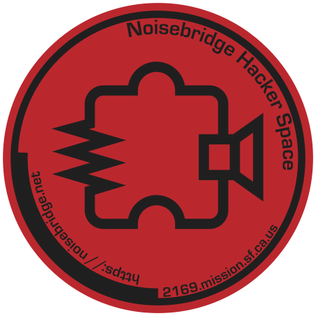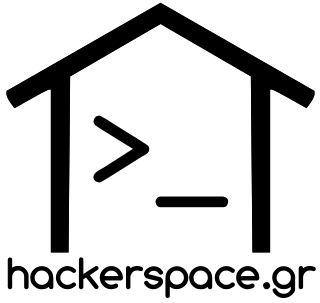Related Research Articles

The Cloyne Court Hotel, often referred to simply as Cloyne, is a historical landmark in Berkeley, California and currently one of the houses of the Berkeley Student Cooperative (BSC), a student housing cooperative. It is located at the north side of the University of California, Berkeley campus at 2600 Ridge Road, near Soda Hall and Jacobs Hall, and is the next door neighbor of the Goldman School of Public Policy.

The Metalab is a hackerspace in Vienna's central first district. Founded in 2006, it is a meeting place of the Viennese tech community, hosting events from cultural festivals to user groups. It has played a catalyst role in the global hackerspace movement and was the birthplace of several internet startup companies.

A hackerspace is a community-operated, often "not for profit", workspace where people with common interests, such as computers, machining, technology, science, digital art, or electronic art, can meet, socialize, and collaborate. Hackerspaces are comparable to other community-operated spaces with similar aims and mechanisms such as Fab Lab, men's sheds, and commercial "for-profit" companies.

HacDC is a hackerspace in Washington, D.C., and a 501(c)(3) nonprofit. According to one member's description, "HacDC members improve the world by creatively rethinking technology. We break, build, and occasionally abuse technology in the pursuit of greater knowledge about how it works and re-purpose it to build new things." In March 2009, its activities were described by The Washington Post. In April 2011, its activities were also mentioned by FastCompany., and NPR's All Tech Considered.
TOG is a hackerspace in Dublin, Ireland. tóg is a word in the Irish language; one of its meanings is 'to build or construct'.

The maker culture is a contemporary subculture representing a technology-based extension of DIY culture that intersects with hardware-oriented parts of hacker culture and revels in the creation of new devices as well as tinkering with existing ones. The maker culture in general supports open-source hardware. Typical interests enjoyed by the maker culture include engineering-oriented pursuits such as electronics, robotics, 3-D printing, and the use of computer numeric control tools, as well as more traditional activities such as metalworking, woodworking, and, mainly, its predecessor, traditional arts and crafts.

Noisebridge is an anarchistic maker and hackerspace located in San Francisco. It is inspired by the European hackerspaces Metalab in Vienna and c-base in Berlin. Noisebridge describes itself as "a space for sharing, creation, collaboration, research, development, mentoring, and learning". Outside of its headquarters, Noisebridge forms a wider international community. It was organized in 2007 and has had permanent facilities since 2008.

Hackerspace.gr ('hsgr') is a hackerspace in Athens, Greece, established in 2011. It operates as a cultural center, computer laboratory and meeting place. Hackerspace.gr promotes creative coding and hardware hacking through its variety of activities. According to its website: "Hackerspace.gr is a physical space dedicated to creative code and hardware hacking, in Athens".
shackspace is a Stuttgart hackerspace run by shack e.V., a non-profit association, established in 2009. Originally located in North Stuttgart, it moved to Stuttgart-Wangen in March 2011. It is among the largest and fastest-growing hackerspaces in Germany, with over 110 paying members. The mission of shackspace is to foster an environment where people can collaborate on ideas, share knowledge and talents, and explore aspects of life including science, technology, software development, arts and crafts and anything else members express an interest in. shackspace views itself as not only a physical workspace, but also a community of like-minded people.

RaumZeitLabor is a hackerspace operated by non-profit association RaumZeitLabor e. V. in the city of Mannheim, Germany.

Chaosdorf is a hackerspace operated by non-profit association Chaos Computer Club Düsseldorf / Chaosdorf e.V. in the city of Düsseldorf, Germany. It is Düsseldorf’s Chaos Computer Club chapter.

Genspace is a non-profit organization and a community biology laboratory located in Brooklyn, New York. Stemming from the hacking, biohacking, and DIYbio movements, Genspace has focused on supporting citizen science and public access to biotechnology. Genspace opened the first community biology lab in 2010 and a Biosafety Level One laboratory in December of that year. Since its opening, Genspace has supported projects, events, courses, art, and general community resources concerning biology, biotechnology, synthetic biology, genetic engineering, citizen science, open source software, open source hardware, and more.

HackerspaceSG is a 1,202-square-foot (111.7 m2) technology community center and hackerspace in Singapore. While predominantly an open working space for software projects, HackerspaceSG is also a landmark of the Singapore DIY movement, and also hosts a range of events from technology classes to biology, computer hardware, and manufacturing. The space is open to all types of hackers.

GovHack is a significant annual open government and open data hackathon, attracting over 15,000 participants since 2009. First run as a small Canberra-based event, it quickly expanded to an international competition with simultaneous events taking place in major cities across Australia and New Zealand each year, with virtual events for remote and international participants. Since its inception, over 2,500 projects have been published by participants to demonstrate the practical value of open data.
Ryan Bethencourt is an American scientist, entrepreneur, and biohacker best known for his work as co-founder and CEO of Wild Earth, Partner at Babel Ventures and cofounder and former Program Director at IndieBio, a biology accelerator and early stage seed fund. Bethencourt was head of life sciences at the XPRIZE foundation, a co-founder and CEO of Berkeley Biolabs, a biotech accelerator, and Halpin Neurosciences, an ALS therapeutics-focused biotech company. Bethencourt co-founded Counter Culture Labs, a citizen science nonprofit, and Sudo Room, a hacker space based in downtown Oakland, California.
Xinchejian is the first hackerspace in China. It was founded in 2010 by David Li, Ricky Ng-Adam, and Min Lin Hsieh in Shanghai, inspired by hackerspaces in the West and the Shanzhai culture of China. Xinchejian is registered as a company, but is run as a non-profit organization, and managed by volunteers.

Double Union is a San Francisco hacker/maker space. Double Union was founded by women in 2013 with the explicit goal of fostering a creative safe space. The organization’s mission is to be a community workshop where women and nonbinary people can work on projects in a comfortable, welcoming environment.
Liberating Ourselves Locally is a makerspace/hackerspace in the Fruitvale district of Oakland, California. It is part of the Bay Area Consortium of Hackerspaces (BACH).
The Omni Commons is a group of nine collectives in San Francisco's Bay Area devoted to DIY and community education. It traces its inception to the Occupy movement, specifically Occupy Oakland, and was founded in 2014 on the principles of "community, positive creation and radical inclusion".
References
- ↑ WIRED Staff. "Mothership HackerMoms: Where Hackerspace Meets Motherhood". Wired. ISSN 1059-1028 . Retrieved 2023-03-10.
- ↑ Nanos, Janelle (7 May 2013). "A Workspace for Hire With Day Care for Kids". Wall Street Journal. Retrieved 2023-03-10.
- ↑ "At Mothership HackerMoms, the Freedom to Be Empowered." 12 September 2012. https://www.mysciencework.com/omniscience/at-mothership-hackermoms-the-freedom-to-be-empowered
- ↑ Dinkelspiel, Frances (2012-04-12). "Mothers come together, create Berkeley 'hacker' space". Berkeleyside. Retrieved 2023-03-10.